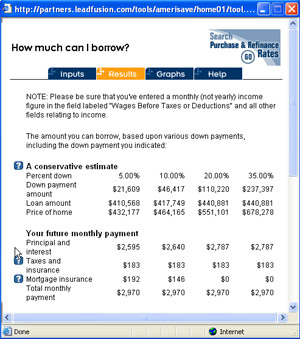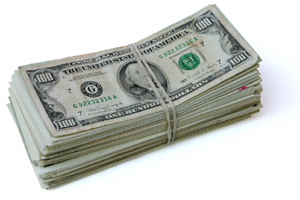Before you begin shopping for a house, you should
find out the maximum amount you can afford to pay. This is usually the sum of two
amounts: the cash you can offer as a down payment and amount you
can borrow.
How much can you borrow?
The first step is to shop for
a good lender. (Click
here for some excellent tips from Jack Guttentag, the Mortgage
Professor, on how to do this.) Guttentag gives top scores to
online lenders Amerisave
and E-Loan for "depth and
comprehensiveness of the information provided," so you may want
to start with them.
At either of these sites, click
"Calculators" on the toolbar, then on "How Much Can I
Borrow?" (for Amerisave) or the "Home Affordability
Calculator" (for E-Loan) to get a rough idea of what you can borrow.
In order to approve a mortgage loan, of course, a lender would need more
information about your
finances and an appraisal of the property you plan to buy.
 |
Many lender websites have
calculators that give you a rough estimate of how much you can
borrow. |
How much should you borrow?
You'll probably be pleasantly
surprised at the amount of money you'll be able to borrow--loan
officers can stretch you to the limit (and beyond) of your ability to
pay with creative devices like adjustable rate mortgages (ARMs),
graduated mortgages, and
interest-only loans. But before you start house hunting, you
should think carefully about how much you should borrow.
Here's a good
resource for thinking this through.
Be aware that mortgage loans over
$417,000 are called jumbos or conforming jumbos (sometimes called
confumbos) and carry higher interest rates than those
under $417,000, which are called conforming or conventional loans.
If possible, try to keep your borrowing below that threshold.
See if you can improve your credit score
Your credit report gives the lending
industry's assessment of how good a credit risk you are. Since this
is one of the factors that a lender considers before approving a
loan, you'll want your score to be as high as possible.
The government requires credit
reporting companies to give you a free annual credit report. Make
sure you go to
annualcreditreport.com to get it. (This
government website explains why you should avoid all the imposter
websites that also offer free credit reports.)
It's a good idea to check your score
early on, so you'll have time to improve it by
fixing errors or making changes in your finances. This
CNN Money article offers suggestions on how to improve your
score.
Pre-approval
When considering offers, sellers
don't just look at price. They also care about whether the deal
is likely to make it through escrow. Sellers hate it when deals
fall through.
A relatively painless way to sweeten
your offer is to append a pre-approval letter or certificate to
it. The letter says that the bank has reviewed your financial
information and that it's willing to lend you enough money to buy the
house at the price you've offered, assuming other conditions are met. It
won't show the maximum
amount you can borrow, though, since that would tip your hand to the
sellers.
Getting pre-approved takes just a day
or so, and involves filling out an application and submitting
documents like paycheck stubs and bank statements. You shouldn't
have to pay a fee.
 |
Applying for a loan is no
longer an ordeal, since lenders have access to an alarming
amount of information about you. |
Pre-qualification is similar to
pre-approval, except that the
financial information provided by the buyer isn't verified.
Because of this, a pre-qualification letter won't impress sellers as
much as a pre-approval letter. (Click
here to read more about the differences between pre-qualification and pre-approval.)
 |
People will often spend
more time shopping for shoes than they will a loan. But
shopping for a slightly lower interest rate can save you lots of money over
time. |
Next topic: Shopping
ŠLori
Alden, 2008. All rights reserved.
|